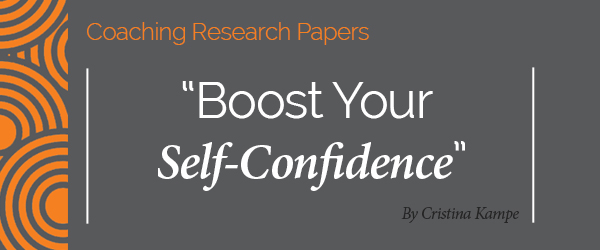 A Research Paper By Cristina Kampe
A Research Paper By Cristina Kampe
(Life Coach, LUXEMBOURG)
1. What is self-confidence and why it is important
According to oxforddictionaries.com, “self-confidence is a feeling of trust in one’s abilities, qualities, and judgment.” It is the belief in ourselves, the belief that we can handle any challenges that come our way.
People with self-confidence start on their journey with conviction, they are more compelling, more influential, their energy is persuasive; they are more attractive because they stimulate, they enthuse, they motivate and inspire. When you believe in yourself, you are more credible and it is more likely that people will believe in you. Confidence will give you the energy to pursue your dreams and the power to overcome obstacles.
Self-confidence is extremely important in almost every aspect of our lives, yet so many people struggle to find it. Sandeep Meshram (2009) advocates that, “if you do not have self-confidence, you will never become successful at all.” He also states that “self-confidence has always been the core of self-development, the building block on which goal setting, motivation problem solving, communication, willpower and other aspects of self-help stem from.”
2. Factors influencing your self-confidence
No one is born with low self-confidence. Self-confidence is not genetically transmitted. Self-confidence is something learned mostly during childhood. As you grow up, if you are constantly disapproved, or if the parents fail to recognize or appreciate you, you might arrive in a place of lack of confidence. Low self‑
confidence will fuel the manifestation of fear and insecurity, making it unlikely for you to become successful. Wilding and Palmer (2010) emphasize that ” Even where we had a relatively happy childhood, we can still absorb and carry with us into adulthood, negative thoughts about ourselves through parent’s criticism.” Anthony (2008) supports the same idea by stating that “you have been conditioned since childhood by false concepts, values and beliefs that have prevented you from realizing how truly capable and unique you are.”
Another factor impacting the self-confidence level is based on people’s tendency to generalize and forecast their future based on past events. Self-confidence may develop slowly, as we experience success in certain areas of our lives. On the other hand, sadly enough, a succession of failures can affect severely people’s self-confidence. Forleo (2008) articulates that “Sometimes, it is during disappointment that we make decisions that limit our mind. Those old decisions hold us back from being fully alive and capable of connecting ” to the reality that surrounds us.
Past experiences make you who you are, but you do not have to remain bound to your past. With determination, you can decide to change your response to what is happening outside you, you can choose to be confident, positive, powerful, you can decide to construct your life the way you want.
3. Beliefs and their implications on the self-confidence level
Beliefs are a very powerful driving force, controlling everything about us. We let them drive us, lead our whole life, reinforcing certain actions, repeating the same mistakes, obtaining the same type of outcomes, keeping the same
behavioral pattern, and loosing around the same issues. Beliefs determine, how we feel about ourselves, about others, and about things in general. They determine our decisions, our actions, our behaviors and ultimately the direction we go in life.
A belief is nothing more than a perspective, a window through which you view the world. When you choose to see the world through the window of positive perspectives, you create a more resourceful point of view and start achieving positive results. Your level of commitment will grow and most likely you will be able to accomplish further successful outcomes, which will feed your high level of confidence.
Conversely, if you opt for the negative perspective, your commitment will drop and you will be holding back in the expectation of failure. With low commitment and negative expectations, results will probably be disappointing and your self-esteem will be eroded even more.
In order to become self-confident, you need to free yourself of your limiting beliefs. As Anthony (2008) expresses it “Unless you get rid of your guilty feeling and stop belittling yourself from your imagined inadequacies, you will be one of these people who continue the fruitless struggle to attain self-confidence and personal freedom.”